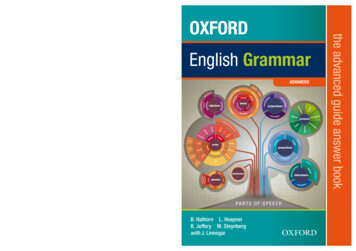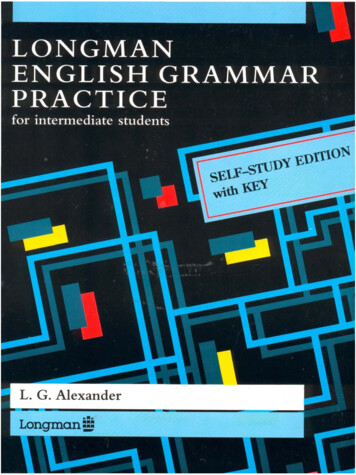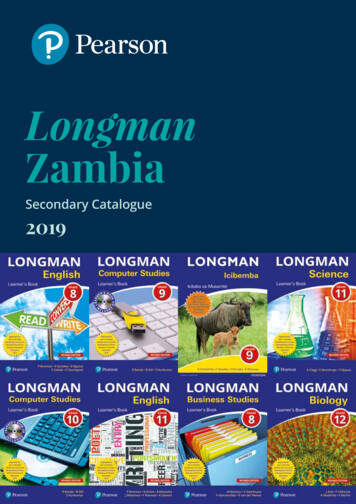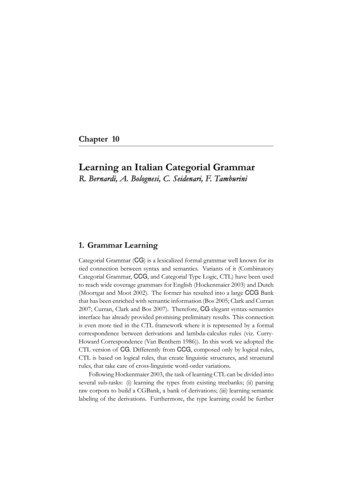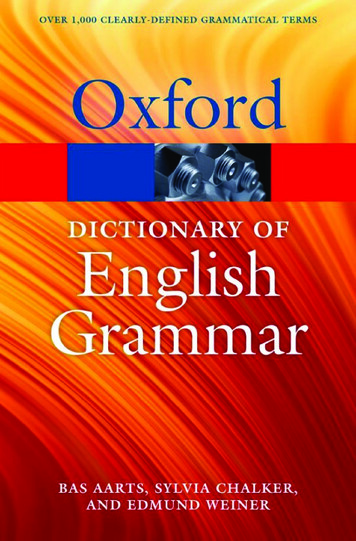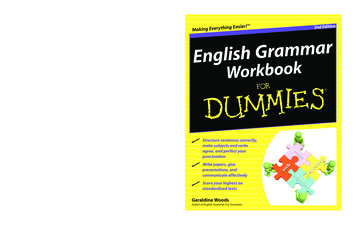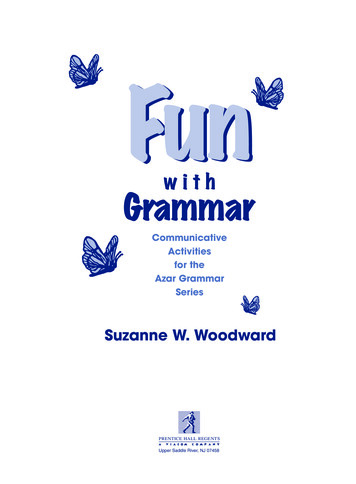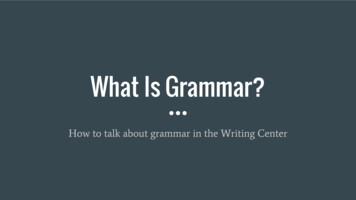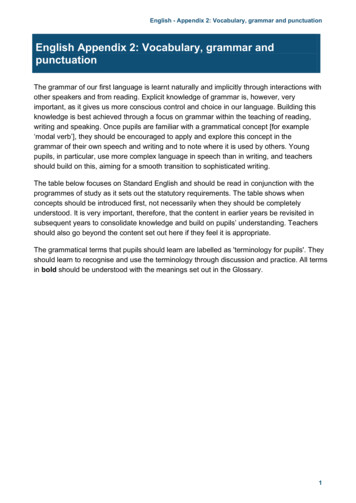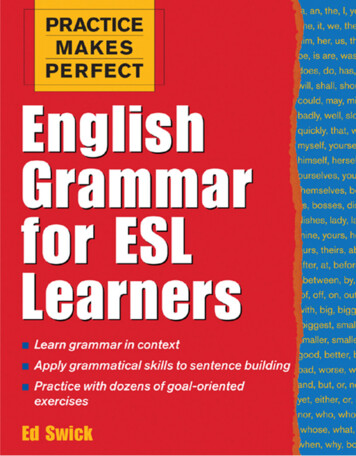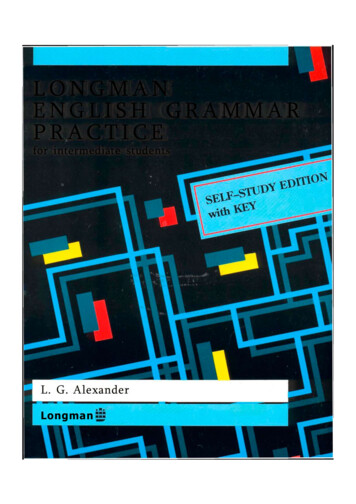
Transcription
LONGMANENGLISH GRAMMARPRACTICEfor intermediate studentsL. G. AlexanderLongman
LONGMANENGLISH GRAMMARPRACTICEfor intermediate studentsL. G. AlexanderL o n g m a n - к
Addison Wesley Longman LimitedEdinburgh Gate, Harlow,Essex CM20 2JE, Englandand Associated Companies throughout the world. Longman Group UK Limited 1990All rights reserved; no part of this publication may bereproduced, stored in a retrieval system, or transmittedin any form or by any means, electronic, mechanical,photocopying, recording, or otherwise, withoutthe prior written permission of the Publishers.Distributed in the United States of American byAddison Wesley Longman, New YorkFirst published 1990Eleventh impression 1998Cartoons by Larry, Ed Mclaughlin and David SimondsB r i t i s h L i b r a r y C a t a l o g u i n g i n P u b l i c a t i o n DataAlexander, L. G. (Louis George) 1932Longman English grammar practice (Intermedíate level)1. English language. GrammarI. Title428.2L i b r a r y o f C o n g r e s s C a t a l o g i n g - i n - P u b l i c a t i o n DataAlexander, L. G.Longman English grammar practice (Intermediate level) / L. G. Alexander,p. cm.1. English language - Textbooks for foreign speakers.2. English language - Grammar - 1950 - Problems, exercises, etc I. TitlePE1128.A4573 1990428.2'4-dc2089-13851CIPSet in 9/11.5 pt. Linotron Helvetica RomanProduced through Longman Malaysia, ACMISBN 0 582 04500 2
ContentsTo the student11The ntence word orderThe simple sentence: verbs with and without objectsThe simple sentence: direct and indirect objectsThe compound sentenceThe complex sentence: noun clausesThe complex sentence: relative pronouns and clausesThe complex sentence:'whose'; defining/non-defining clausesThe complex sentence: time, place, mannerThe complex sentence: reason and contrastThe complex sentence: purpose, result and comparisonThe complex sentence: present participle constructionsThe complex sentence: perfect/past participle 2.42.52.62.72.8One-word nounsCompound nounsCountable and uncountable nouns (1)Countable and uncountable nouns (2)Number (singular and plural) (1)Number (singular and plural) (2)GenderThe 6TheTheTheTheTheThe4indefinite article: 'a/an' (1)indefinite article: 'a/an' (2)definite article: 'the' (1 )definite article: 'the' (2)zero article (1)zero article onal pronouns'One''It' and 'one/some/any/none'Possessive adjectives and possessive pronouns ('my/mine')Reflexive pronouns ('myself')Demonstrative adjs/prons ('this'); 'some/any/no' compounds .65.7Quantifiers countable and uncountable nounsGeneral and specific references to quantityUses of 'some', 'any', 'no' and 'none''Much', 'many', 'a lot of, '(a) few', '(a) little', 'fewer', 'less''Both' and 'all''All (the)', '(a/the) whole', 'each' and 'every''Another', '(the) other(s)', 'either', 'neither', 'each (one of)'66687072747678
Contents6Adjectivesso6.16.26.36.46.5Formation of adjectivesPosition of adjectivesAdjectives that behave like nouns; '-ed/-ing' endingsAdjectives after'be','seem', etc.; word order of adjectivesThe comparison of 77.8Adverbs of mannerAdverbs of timeAdverbial phrases of durationAdverbs of frequencyAdverbs of degreeIntensifiersFocus adverbsViewpoint adverbs, connecting adverbs and inversion90929496981001021048Prepositions, adverb particles and phrasal verbsюб8.18.28.38.48.58.68.78.8Prepositions, adverb particles and conjunctionsPrepositions of movement and position; prepositions of timeParticular prepositions, particles: contrasts (1 )Particular prepositions, particles: contrasts (2)Particular prepositions, particles: contrasts (3)Phrasal verbs: Type 1, verb preposition (transitive)Phrasal verbs: Type 2, verb particle (transitive)Phrasal verbs: Type 3, verb particle (intransitive)Type 4, verb particle preposition (transitive)1061081101121141161181209Verbs, verb tenses, imperatives1229.19.29.39.49.59.69.79.89.99.10The simple present and present progressive tenses (1)The simple present and present progressive tenses (2)The simple past tenseThe simple past and past progressive tensesThe simple present perfect and present perfect progressiveThe simple past perfect and past perfect progressive tensesThe simple future tenseThe simple future, the future progressive, the future perfect'Going to' and other ways of expressing the futureThe imperative12212412612813013213413613814010Be, Have, Do14210.110.210.310.410.510.610.7'Be'as a full verb (1)'Be' as a full verb (2)'There' 'be'Verbs related in meaning to 'be''Have' as a full verb 'possess'; 'have got' 'possess''Have' as a full verb meaning 'eat', 'enjoy', etc.'Do'as a full verb14214414614815015215411Modal auxiliaries and related verbs15611.111.211.3The two uses of modal verbsUses of modals (etc.) to express ability and inabilityUses of modals (etc.) to express permission and prohibition156158160
13Uses of modals (etc.) to express certainty and possibilityUses of modals to express deductionUses of modals for offers, requests and suggestionsExpressing wishes, etc.: 'I wish', 'if only', 'it's (high) time'Expressing preferences: 'would rather' and 'would sooner''It's advisable .'/'It's necessary .''It isn't advisable .'/'It isn't necessary .'/'It's forbidden'Modals to express habit: 'used to', 'will' and 'would''Need'and'dare'as modals and as full verbs'Would/wouldn't'; 'that .should'; 'there' modal16216416616817017217417617818012The passive and the causative18212.112.212.3General information about formUses of the passiveForm and use of the causative18218418613Questions, answers, s/No questions, negative statements, Yes/No answersAlternative negative forms and negative questionsTag questions and echo tagsAdditions and responsesQuestion-word questions (1):'Who(m).?','What.?'Question-word questions (2): 'When?', 'Where?', 'Which?', 'Whose?'Question-word questions (3): 'Why?', hose?'Questions about alternatives; emphatic questions with'ever'18819019219419619820020220414Conditional sentences20614.114.214.314.4Type 1 conditionals,Type 2 conditionals"'Type 3 conditionalsMixed conditionals;'unless/if. not', etc.20620821021215Direct and indirect speech21415.115.215.315.415.515.6Direct speech'Say','tell'and'ask'Indirect statements with tense changesIndirect questions with tense changesUses of the to-infinitive in indirect speechWhen we use indirect speech21421621822022222416The infinitive and the 4ng' form22616.116.216.316.416.516.616.716.8The bare infinitive and theto-infinitiveThe bare infinitive or the '-ing' form; theto-infinitiveVerb ( noun/pronoun) to-infinitiveAdjectives and nouns to-infinitiveThe'-ing'formVerb the'-ing'formAdjectives, nouns and prepositions '-ing'The to-infinitive or the '-ing' form?226228230232234236238240Index242Key253
AcknowledgementsDifferent versions of these materials were tried out with students in five countries. The book is In itspresent form partly as a result of the useful reports and In many cases the very detailed commentsreceived while the work was being developed. I would like to thank the following:BrazilVera Regina de A Couto and staffRosa LenzuénLouise TowerseyMichael WatkinsWerner KiewegCultura Inglesa, RioNorman LewisGymnasium WildeshausenRobert NowacekVolkshochschule, KaufbeurenSandra KlapsisJoanna MalliouGeorge RigasHomer Association, AthensThe Morai'tis School, AthensItalyPaola Giovamma OttolinoLiceo Linguistico, A. Manzoni, MilanoUnited KingdomSue BoardmanPat LodgeBell School, Saffron WaidenAlan FortuneËaling College of Higher EducationMary StephensEurocentre, BournemouthM. MilmoSteve MooreJennifer SwiftAnn TimsonJosephine von WaskowskiEurocentre, Lee GreenGermanyGreeceCultura Inglesa, CuritibaUniversity of MunichI would also like to thank:- Donald Adamson and Neville Grant for their detailed and stimulating commentaries and particularlyRoy Kingsbury for his comprehensive report and notes on exercise-types.- my personal assistant, Penelope Parfitt, and my wife, Julia, for reading and commenting on thework at every stage of its development.I am especially grateful to my publishers and their representatives for administering and monitoring thetrialling of the manuscript in various locations round the world and for exercising such care and skill tosee the work through to publication.
To the studentWhy do we learn grammar?There is no point in learning grammar for the sake of learning grammar. Grammar is the supportsystem of communication and we learn it to communicate better. Grammar explains the why and howof language. We learn it because we just can't do without it.Who is this book for and what does it cover?This book deals entirely with English as a foreign language (EFL). It is for intermediate students whoare working with a teacher or working on their own. It covers every important area of the Englishlanguage. If you look at the Contents pages, you will find sixteen major areas which form the basis ofEnglish grammar. This book is based on the Longman English Grammar and the grammaticalinformation in it is all drawn from this work. Longman English Grammar Practice has been designed tostand on its own. Students who require further grammatical information can refer to the LongmanEnglish Grammar.How the material is organizedLongman English Grammar Practice is a practice book. It is intended to support (not replace) thematerial in language courses and is organized for this purpose: The material is laid out on facing pages.Each set of facing pages deals with a major point of grammar.This major point is divided into small, manageable amounts of information. Clear notes explain thepoints to be practised, followed by an exercise on just those points.The last exercise is in context, usually an entertaining story with a cartoon illustration. It sums up allyou have learnt in the exercises you have just done and shows you how the language works. It is a'reward' for the hard work you have just been doing!Cross referencesIf you see e.g. [ 7.3A] in thé notes, it means that a similar point is discussed in some other part of thebook. Follow up the reference for parallel practice or information if you want to. If you see e.g. [ LEG4.30] at the top of the notes, it means that the point is dealt with in the Longman English Grammar.Follow up the reference if you want 'the whole story'.How to workYOU DON'T HAVE TO WORK THROUGH THIS BOOK FROM START TO FINISH!It is not arranged in order of increasing difficulty.Select a chapter or part of a chapter which you want to study. Do this by referring to the Contentspages or the Index. Usually, this will be a topic you have been dealing with in your languagecourse. Then:1 Read the notes carefully (called Study). Notes and exercises are marked like this:И Elementary [**] Intermediate (most exercises) I***I AdvancedYou will sometimes find that you know some, but not all, of the points in an exercise marked [**].2 Do the exercises (called Write). Always leave the story till last (called Context).3 Check your answers with your teacher.4 If you have made mistakes, study the notes again until you have understood where you wentwrong and why.1
1 The sentence1.1 Sentence word order1.1A The basic word order of an English sentence [ LEG I .3]Study:ИThe meaning of an English sentence depends on the word order.1 We put the subject before the verb and the object after the verb:The cook burnt the dinner.2 Adverbials (How?, Where?, When7} usually come after the verb or after the object:He read the note quickly. (How?) I waited at the corner (Where?) till 11.30. (When?)3 The basic word order of a sentence that is not a question or a command is usually:subjectverbobjectadverbialsHow?Where? When?Iboughta hatyesterday.The children have gonehome.Weateour meal in silence.4 We also put the time reference at the beginning: Yesterday I bought a hat. [ 7.2A]HF?*Write 1 :a Rewrite the sentences that don't make sense.b Mark all the sentences in the exercise S V О to show Subject, Verb, Object.12345678910Write 2:a Arrange these words in the right order. Use a capital letter to begin each sentence,b Mark each rewritten sentence S V О M P T to show:Subject, Verb, Object, Manner (How?), Place (Where?), Time (When?).1234567891011122Has set John Bailey a new high-jump record. ( Ш о М . В . Ш Щ . М Ш . Ш . . . T t íThe passport examined the passport officerThese biscuits don't like the dogsThe shop assistant is wrapping the parcelHave seen the visitors the new buildingsMy father didn't wash the dishesThe pipe is going to fix the plumberWill the goalkeeper catch the ball?Has the meal enjoyed the guest?Can't play John the gametill 11 o'clock this morning slept the childrenthe papers into the bin he threwI don't speak well Englishhides I Mrs Jones her money under the bedcarefully this suitcase you didn't packon this shelf I left this morning some moneyfrom the bank a loan you'll have to getthe phone in the middle of the night woke me upin the park you shouldn't walk at nightyour food I you should eat s'owlymy term begins in Octoberyour article j 11 quickly last night in bed read
1.1 Sentence word order1.1BThe forms of a sentence [ LEG I .2]A sentence can take- a statement:- a question:- a command :- an exclamation:Study:ngany one of four forms:The shops close/don't close at 7 tonight.Do the shops close at 7 tonight?Shut the door./Don't shut the door.What a slow train this islWhen we write a sentence, we must begin with a capital letter and end with a full stop (.), aquestion mark (?), or an exclamation mark (!).If there are quotation marks ('.') or (".") around spoken words in a sentence, we put otherpunctuation marks 'inside' them:'I'm tired,'she said. (Not "I'm tired', she said.*) [ 15.1A-B]Write:a Arrange these groups of words in the right order. Add (.), (?) or (!).b Describe each sentence as a statement, question, command or exclamation: S, Q, С or E.123456789101.1 СWrite:the coffee don't spillР.спй.лрШ.Ш.çoff&.,today's papers have you seento meet you how nicemy umbrella where did you putarrived the train fifteen minutes lateon time I the plane won't arrivethis electricity bill I can't payfor me please open the doorthe nearest hotel where's he askedthe bill I can't pay 11 he cried( С(((((((((ContextRead this story and arrange the words in each sentence in the right order.Add capital letters and (,), (.), (!) or (?) in the right places.A QUIET SORT OF PLACE!1 my car I I parked in the centre of the village2 near a bus stop an old man I saw3 'beautiful village what a' I exclaimed4 'live here how many people'5 'seventeen people there are' the old man said6 'here I have you lived how long'7 'all my life I have lived here'8 'isn't it I it's a quiet sort of place'9 'here a quiet life we live10 a cinema we don't have or a theatre11 our school I five years ago was closed12 only one shop we have13 calls I a bus once a day14 here in 55 B.C. came the Romans15 since then has happened nothing'3
1 The sentence1.2 The simple sentence: verbs with and without objects1.2AStudy:i**iWhat is a complete sentence? [ LEG 1.2]1 When we speak, we often say things like All right! Good! Want any help?These are 'complete units of meaning', but they are not real sentences.2 A simple sentence is a complete unit of meaning which contains a subject and a verb,followed, if necessary, by other words which make up the meaning. So:Made in Germany is correct English but it is not a sentence because it doesn't have a subject.My car ivas made in Germany, is a complete sentence with a subject and verb.We can't say e.g. *ls tired* because we need a subject [ 4.1 A, 4.3A]: He is tired.3 The subject may be 'hidden': Open the door, really means You open the door. [ 9.ЮВ]Write:Put a tick ( / ) beside real sentences.123456789101.2BStudy:шMade in Germany.This car was made in Germany. /To write a letter.Standing in the rain.I want to write a letter.Is tall.Do you like?The train has arrived.Have finished my work.You should listen.11121314151617181920Verbs with and without objects [ LEGSit down please.You can't park here.Don't interrupt.I understand.She doesn't like me.ynder the water.Ate.A bottle of ink.He's a doctor.What happened?1.4,1.9,1.10,1.12, A p p i ]1 We always have to use an object after some verbs: e.g. beat, contain, enjoy, hit, need.We call these transitive verbs. We have to say:Arsenal beat Liverpool. But we can't say *Arsenal beat. *2 Some verbs never take an object: e.g. ache, arrive, come, faint, go, sit down, sleep, snow.We call these intransitive verbs. We have to say:We arrived at 11. But we can't say *We arrived the station at 11.*3 Some verbs can be used transitively or intransitively: e.g. begin, drop, hurt, open, ring, win.We can say: Arsenal won the match, (transitive) or Arsenal won. (intransitive)Write:Put an object (a pronoun or a noun) after these verbs only where possible.1 The box contains .ршШ*.-234567894The train has arrivedThe phone rangSomeone is ringingYou needWe sat downDon't hitDid you beatWho opened10111213141516? 17? 18The door openedThis is a game no one can winThe concert beganI beganIt's snowingQuick! She's faintedDid you enjoyMy head achesMy foot hurtsat 7.30.?
1.2 The simple sentence: verbs with and without objects1.2CSentences with linking verbs like 'be' and 'seem' [ LEG1.9,1.11,10.23-26]Verbs like be [ 10.1-3] and seem [ Ю.4] are 'linking verbs'. They cannot have an object.The word we use after be, etc. tells us something about the subject. In grammar, we call this acomplement because it 'completes' the sentence by telling us about the subject.In He is ill. She seems tired, etc. the words ill and tired tell us about he and she.Study:i**iA complement may be:Frank is clever.- an adjective:Frank is an architect.- a noun:Frank is a clever architect.- an adjective noun:- a pronoun:This book is mine.- an adverb of place or time: The meeting is here. The meeting is at 2.30.- a prepositional phrase:Alice is like her father.Write:a Complete these sentences using a different complement for each sentence.b Say whether you have used a noun, an adjective, an adjective noun, etc.1 My neighbour is very23456789101.2DWrite:My neighbour isThis apple tastesThe children areThe meeting isWhose is this? It'sJohn looksThat music soundsYour mother seemsI want to bewhen I leave schoolContextRead this story and arrange the words in each sentence in the right order.Add capital letters and (,), (.), (!) or (?) in the right places [ 1.1В].SO PLEASE DON'T COMPLAIN !1 the local school attends my son Tim2 to his school I my wife and I went yesterday3 we I to his teachers spoke4 Tim's school report we collected5 very good wasn't Tim's report6 in every subject were his marks low7 was waiting anxiously for us outside Tim8 'my report how was' eagerly he asked9 'very good it wasn't' I said10 'you I harder must try11 seems that boy Ogilvy very clever12 good marks he got in all subjects'13 'clever parents Ogilvy has' Tim said5
1 The sentence1.3 The simple sentence: direct and indirect objects1.3ASubject verb indirect object direct object: 'Show me that photo'[ LEG 1.13]We can use two objects after verbs like give and buy.Instead of: Give the book to me, we can say: Give me the book.Instead of: Buy the book for me, we can say: Buy me the book.Study:0Some verbs combine with TO: bring, give, lend, pay, post, sell, send, show, tell, write:Bring that book to me. -» Bring me that book.Other verbs combine with FOR: buy, choose, cook, cut, do, fetch, find, get, make, order:Please order a meal for me. -» Please order me a meat.We can put it and them after the verb: Give it to me. Buy them for me. Do it for me.With e.g. give and buy, we can say: Give me it. Buy me them. (But not *Do me it")We say: Give it to John. Buy them for John. (Not *Give John it* *Buy John them *)Write:You want people to do things for you. Write suitable polite requests using it, them or one [ 4.3В].1234561.3BWhere are my shoes? (find) PleaseJohn needs a new coat, (buy) PleaseI can't .reach that cup. (pass) PleaseAnn wants to see our flat, (show) PleaseI can't do the shopping, (do) PleaseI'd like a copy of that book, (order) Please,.„.,.:1.:.Verb object 'to' noun or pronoun: 'Explain it to me' [ LEG1.12.1]There are some verbs like explain which do not behave in exactly the same way as give.For example, we can say: Give the book to me, or Explain the situation to me.Give me the book, (but not 'Explain me the situation. *)Study:We cannot use an indirect object (me) immediately after explain. We can only have:verb object 'to':He explained the situation to me.He confessed his crime to the court.Other verbs like explain and confess are: admit, announce, declare, demonstrate, describe,entrust, introduce, mention, propose, prove, repeat, report, say, suggest.Write:Complete these sentences giving the right order of the words in brackets.123456789106You must declare (the Customs/this camera)Aren't you going to introduce (me/your friend)?You can say (me/what you like)Who suggested (this idea/you)?He confessed (his crime/the police)I have never admitted (anyone/this)Can you describe (me/this man)?Please don't mention (this/anyone)I'm going to report (this/the headmaster)I don't want you to repeat (what I told you/anyone)
1.3 The simple sentence: direct and indirect objects1.3CStudy:E3The two meanings of 'for' [ LEG1.13.3]1 We can use for after all verbs which have two objects [ 1 .ЗА].2 When we use for after verbs normally followed by to (give, post, read, sell, show, tell, etc.) it canmean 'instead of: I'll post it for you. ( to save you the trouble)3 When we use for after verbs normally followed by for (buy, choose, do, find, keep, order, etc.)the meaning depends on the context. It can mean 'for someone's benefit':Mother cooked a lovely meal for me. ( for my benefit, for me to enjoy)It can mean 'on someone's behalf/instead of:I'll cook the dinner for you. (on your behalf/instead of you - to save you the trouble)Write:Tick ( ) to show whether for means 'instead of you/me' or 'for your/my benefit'.'instead of123456789101.3DWrite:'for your/my benefit'I've cooked a meal for you and I hope you enjoy it.Let me cook the dinner for you this evening. - Thanks!I've made this cake for you. Do you like it?I'll post this letter for you, shall I?I've bought this especially for you.I've got some change. Let me pay the bill for you.As you're busy, let me book a room for you.I've saved some of this pudding for you.I can't choose a tie myself. Please choose one for me.My father has bought a wonderful present for me.ContextPut a tick ( ) where you think you can change the word order.A CURE FOR HYSTERIAWhen I was a girl, my parents sent me to a very strict school. They had to buy an expensive uniformformeV and pay school fees forme2. Our headmistress, Miss Prim, never smiled. She explainedthe school rules to, us3and expected us to obey them. 'I will never say anything to you4twice,'she used to say. We had to write a letter to our parents5once a week and show it to Miss Prim6before we sent it. I can still remember some of the school rules. We were not allowed to lend anythingto anyone7. We were not allowed to give each other help8with homework. We had to reportunusual situations to the headmistress9. One morning, during assembly, a girl fainted. The nextmorning, two more fainted. This continued to happen for several mornings. Mass hysteria had set in!But Miss Prim put an end to it. She announced a new rule to us10 : 'No girl will faint in College!'And after that, no one did!No girl will faint in College!7
1 The sentence1.4 The compound sentence1.4AThe form of a compound sentence [ LEGI 17-20]1 When we join two or more simple sentences [ 1.2A], we make a compound sentence:Tom phoned. He left a message. - Tom phoned and left a message.2 The name we give to 'joining words' is conjunctions.These are the conjunctions we use to make compound sentences:and, and then, but, for, nor, or, so, yet;either. or; neither. nor.; not only. but. (also/as well/too).3 We can use conjunctions to-addition (and)-.- continuation (and then):- contrast (but, yet):- choice (or):- result (so):- reason (for):show, for example:He washed the car and polished it.He washed the car and then polished it.She sold her house, but/yet (she) can't help regretting it.You can park your car on the drive or on the road.He couldn't find his pen, so he wrote in pencil. .We rarely stay in hotels, for we can't afford it.4 We do not usually put a comma in front of and, but we often use one in front of otherconjunctions: He washed the car and polished it. (no comma before and)Compare:He washed the car, but didn't polish it. (comma befqre but)5 We keèp to the basic word order in a compound sentence [ 1.1 A, 1.2C]:subject verbobjectconjunction subject verb complementJimmyfell off his bike, but(he)wasunhurt.6 When the subject is the same in all parts of the sentence, we do not usually repeat it:same subject: Tom phoned. He left a message. -» Tom phoned and (he) left a message.different subjects: Tom phoned. Frank answered. -» Tom phoned and Frank answered.7 We usually repeat the subject after so: He couldn't find his pen, so he wrote in pencil.8 We always have to repeat the subject after for. For is more usual in the written language and wecannot use it to begin a sentence [compare 1.9A]:We rarely stay at hotels, for we can't afford it.Write 1 :Compound sentences with the same subjectJoin these simple sentences to make compound sentences. Use the words in brackets.1 I took the shoes back to the shop I complained about them, (and)I toxHt the, sJw&s Jnwi. to th& hop and, œmfilç 2 Your mother phoned this morning. She didn't leave a message, (but)3 I can leave now. I can stay for another hour. (I can either. or)4 Jim built his own house. He designed it himself. (Jim not only . but. as well)5 I don't know what happened to him. I don't care. (I neither. nor)6 My new assistant can type very well. He hasn't much experience with computers, (but)8
1.4 The compound sentenceWrite 2:Compound sentences with different subjects and with 'so/for'Join these simple sentences to make compound sentences. Use the words in brackets.1 The taxi stopped at the station. Two men got out of it. (and)Iht.tazó.th&y txcUxnv отф tiu/v. тмь.оъиь.of.it.2 You can give me some advice. Your colleague can. (Either you . or)3 We got ready to get on the train. It didn't stop, (but)4 No one was in when we called. We left a message, (so)5 We didn't want to get home late after the film. We went straight back, (so)6 The old lady was nervous. She wasn't used to strangers calling late at night, (for)7 I've always wanted to live in the country. My parents prefer to live in town, (but)8 The letter has been lost. The postman has delivered it to the wrong address, (or)9 For a moment the top of the mountain was visible. A cloud covered it. (and then)10 Jane was a successful career woman. Her mother wanted her to be a housewife, (yet)1.4BWrite:ContextPut a circle round the correct words in brackets.(NOT SO) MERRY-GO-ROUND!The cústomers aHhe funfair Were leaving ( ñcjybut) the lights were going out. The last two people ondodgem cars paid (2and/so) left. The big wheel stopped (3for/and) the merry-go-round stopped ("aswell/not only). The stalls closed down (5so/and) the stall-owners went home. At 2 a.m. fournightwatchmen walked round the funfair, (6but/so) there was no one to be seen. 'I'm fed up walkinground,' one of them said, (,7yet/and) what can we do?' 'We can (8or/either) play cards (9either/or) sitand talk.' They were bored, (10so/for) there was nothing to do on this quiet warm night. 'We can have aride on the merry-go-round!' one of them cried. 'That'll be fun!' Three of them jumped on merry-goround horses (11yet/and) the fourth started the motor. Then he jumped on too (12and/but) round theywent. They were having the time of their lives, (13but/so) suddenly realized there was no one to stopthe machine. They weren't rescued till morning (14and/but) by then they felt very sick indeed!9
1 The sentence1.5 The complex sentence: noun clauses1.5A Introduction to complex sentences [ LEG I .21]Study:l**l1 We can join two or more simple sentences to make complex sentences:The alarm was raised. The fire was discovered.The alarm was raised as soon as the fire was discovered.The alarm was raised when the fire was discovered.The alarm was raised after the fire was discovered.2 We can use many different kinds of 'joining words' (or conjunctions) to make complexsentences: after, as soon as, when, since, that, if, so that, whether, etc. [ 1.5-10]3 In a complex sentence there is one 'main' idea and one or more 'subordinate' ideas.We can take the main idea (or clause) out of the sentence so that It stands on its own:The alarm was raised is a main clause: it can stand on its own. as soon as the fire wasdiscovered cannot stand on its own. It is subordinate to the main clause.Write:Underline the main clauses in these sentences.123451.5BYou can tell me all about the film after I've seen it myself.When you've finished cleaning the car, you can help me with the dishes.You didn't tell me that you were going to invite so fnanyguests.I walk to work every morning so that I can get some exercise.Since no one answered my call, I left a message on the answer-phone.Noun clauses derived
Longman Englis grammah practicr (Intermediate levele /) L. G. Alexander , p. cm. 1. English languag -e Textbook fos foreigr n speakers. 2. Englis languagh -e Gramma -r 1950 - Problems exercises, et,c I Titl. e PE1128.A4573 1990 428.2'4-dc20
